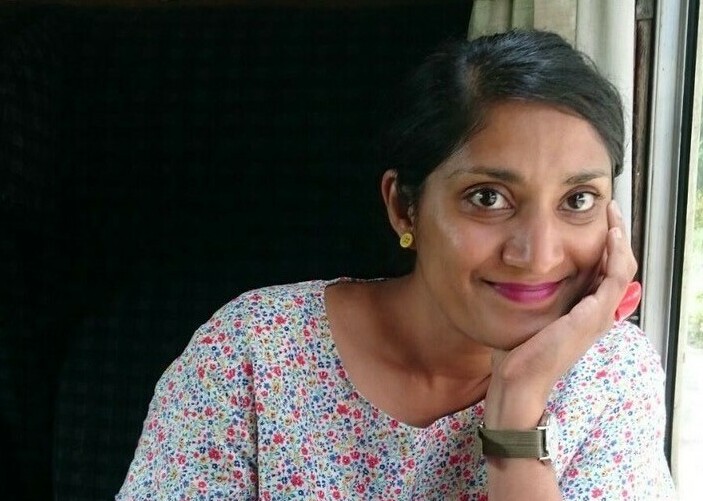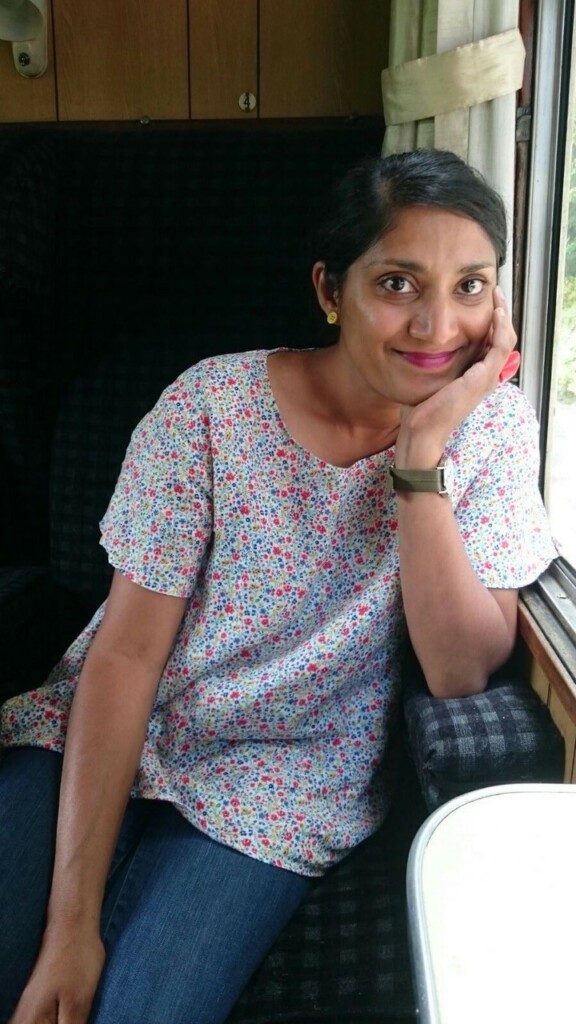Autobiographical Notes Chitra Ramaswamy

Share this
Part One (Life without James Baldwin)
I was born in south-west London 44 years ago. As James Baldwin wrote in his ‘Autobiographical Notes’ which opens Notes of a Native Son (1955) – and to which these notes, and indeed the authenticity of my adult life, is indebted – I also began to think of writing my own words at about the same time as I learned to read. This is an audacious admission, but it is true. What makes a child think they can do a thing before they can understand it can be done? I do not know. But growing up in 1920s and 30s Harlem, Baldwin, the oldest child in his family, took on the care of his brothers and sisters as they were born ‘with one hand’ while he ‘held a book with the other’. I had no such responsibilities with which my love of books had to contend, but I also read anything and everything. A young voracious reader cares little for quality; it is quantity that counts. The meanings of the words, the stories they conveyed, were not the point. What mattered was their accumulation. I read Ladybird books and cereal packets with the same enthusiasm. I remember diving underwater in the bath to see how many words on the shampoo bottle I could do before having to burst through the surface, gasping for air. Gasping, always, for more words.
I had a hunger for explanation, I now see, a need to shore up ways to describe the life I was living. All this was unconscious. The life that I was living appeared to be beyond description. I had neither read it on a page nor seen it described in the world. That we were not like other families seemed to be no one’s fault but ours.
I grew up in Richmond upon Thames, a rarefied world perched atop a hill, a position so emblematic it seemed bestowed like an act of geographical entitlement. The tuck-shop where we bought our penny sweets in thin white paper bags after school was called The Hilltop. JMW Turner painted the view from the hill. Mick Jagger and Jerry Hall lived in one of the handsome white mansions that overlooked it. One of Charles Dickens’ favourite places to mark a birthday or launch a book was at the Star and Garter, in his time a hotel, in mine a home for injured war veterans, nowadays a meticulous refurbishment of luxury two, three and four-bedroom residences. History had left its mark on Richmond, even if we seemed to be absent from its story.
We were a brown family in a white middle-class world. When people were being racist – though I would never have dreamed of calling it that – they would turn to me, squeeze my skinny brown arm affectionately, and say, ‘but not you, Chitra’. I was relieved. But our otherness extended further, like the view from Richmond Hill over the serpentine river. We were also from south India, or at least my parents were – the half of the subcontinent that no one seemed to know because it contained neither the Taj Mahal nor the kormas they ordered on a Friday night. Most people thought my father was the Pakistani man running the local newsagent. Why this offended my Hindu parents so much, I could not understand. They spoke a language – Kannada – that no one had heard of, and that my London-born sister and I could not speak. It was often mistaken for ‘Canadian’ when I tried to voice it out loud. Canadian! How funny.
And so, I buried my big brown nose, which was the blight of my life, and the place where all my shame seemed to reside and grow, in books. In a seizing of the narrative, I also wrote, and wrote, and wrote. Stories about animals. I recall a family of rabbits that went on a lot of Enid Blyton adventures and did an improbable amount of picnicking. Stories about a little orphan girl with red hair and green eyes who was clearly an Anne of Green Gables knock-off, with whom my sister and I were obsessed. Anne Shirley was smart, a dreamer, a pale skinny orphan girl from the outside making her way into the full fat bucolic community life of Avonlea, with its nosy ladies gossiping on decks and raspberry cordial keeping cool in the pantry. Anne was doing it on her own terms, and it worked. Everyone in Avonlea – and half of Halifax – learned to love Anne for who she was, and she learned to love her red hair. In a solemn tribute, my sister and I learned the entirety of Tennyson’s poem ‘The Lady of Shallot’, which Anne loved to recite, for succour, as she went about her life. She was as close as we could get to inhabiting ourselves.
Part Two (Life with James Baldwin)
When I found James Baldwin, I would like to be able to write that I was a teenager – in that critical moment when we need the things we need to show up for us. It is not quite true. By this point I had left Richmond upon Thames, and not by choice. Our house was repossessed and, just like that, the rarefied life at the top of the hill, which had always felt conditional, was over. For those who belonged there, that life could not be taken from them. For us, we passed through like flour through a sieve.
But then I did make a choice. I left England. My sister, interestingly, did the same, but she went further, to Japan. Baldwin fled New York for Paris. My move was less dramatic but, to me, just as glamorous – I moved 400 miles north to Glasgow, which possesses something of a mini-Manhattan about it. I had moved to Scotland. Another other country. One with which I shared even less history.
There, studying English, I came across Giovanni’s Room (1956), Baldwin’s Paris novel. His gay novel. The one that might have been an antidote to shame if I had been there yet. But I was not. I had just discovered Toni Morrison’s books and could not see the attractions of anyone else. Also, I was in love with men and had not yet met the woman with whom I would spend this precious life. I was still – I still am – busy coming to terms with my racial identity. Or rather, the ways in which I have been unseen by white people and unclaimed by brown people. Coming to terms with my own alienation, which cannot be overcome, and which I no longer wish to. Or now, coming to terms with my complete identification with James Baldwin.
It was Notes of a Native Son, which I finally read in my late 30s, that begot me. First, I read ‘Stranger in the Village’, in Harper’s Magazine, originally published in October 1953. Its opening line became a companion for life:
‘From all available evidence no black man had ever set foot in this tiny Swiss village before I came.’
This was, if not the complete reality, the feeling imbuing my entire childhood. I had grown up, psychologically, in that Swiss village. Reading Notes of a Native Son allowed me to leave it behind, return to it, and survive it, mostly intact. In Anne Shirley terms, I began to love my red hair.
‘Autobiographical Notes’, which is just seven delicious pages long, carried me further. Baldwin wrote of his ‘special attitude’, how he was ‘a kind of bastard of the west’ who, when he followed the line of his own past, wound up not in Europe but in Africa. The question was how to become himself, surrounded by a world and a history that did not contain him – and remember, he was writing these words neither in his native America nor his ancestral Africa, but in a hotel in Paris. This was my predicament, spelled out half a century earlier, by the bravest of men in the most beautifully wry words. Words that make me gasp every time I read them. As though I’ve ingested them underwater. While holding my breath.
Baldwin’s solution was to rely on himself. He would have to ‘appropriate these white centuries’ and ‘accept his special attitude’. The stakes were so high. If he did not achieve this, there would be no place for him in this world. And if there was no place for this particular queer Black man, there would be no place for me either.
I ended up writing about ‘my special attitude’ in what is probably the most personal chapter of my book, Homelands (2022). It is an attitude which was formed by a single paragraph of Baldwin’s words in ‘Autobiographical Notes’. He closes that breathtaking essay with a brief list of his interests. So, as I began with a historical echo of that essay’s opening line, I shall close with my list.
I, like Baldwin, love to eat and drink and laugh. I am also deadened by earnestness, and, though I’m embarrassed to admit it, find those who ingratiate themselves with others (they were called try-hards at school) abhorrent. I love my dog, and to watch any dog being a dog is a source of the purest pleasure for me. I love walking, and the syncopation, sprawl and anonymity of cities. I love nature, though I never feel entirely at home in it. I love being in water. I love reading books, and writing. The practice of using words to find out what I think is when I am most at peace. I love babies, children, my parents, which is to say people, really, flaws and all, even – if in theory only – the ones who try too hard. I love the vicissitudes of a single day.
Among his interests Baldwin declares that he loves America more than any country in the world, and while I couldn’t honestly say the same for Britain, I must admit that I do love this country of mine, and even in this frightening moment in its history, I have no desire to live anywhere else on earth. I have many responsibilities and would like to live up to all of them.
I am like James Baldwin.
I want to be an honest woman and a good writer.

Chitra Ramaswamy is a journalist and author. Her latest book, Homelands: The History of a Friendship (Canongate) is a work of creative non-fiction exploring her friendship with a 99-year-old German Jewish refugee called Henry Wuga. It won the Saltire Non-Fiction Book of the Year and was included in the Guardian’s top memoirs and biographies of 2022.

We are grateful to WritersMosaic for their grant to support our James Baldwin projects. Audio versions of this essay can be found at writersmosaic.org.uk.
Photo credit: Buzzy Enterprises